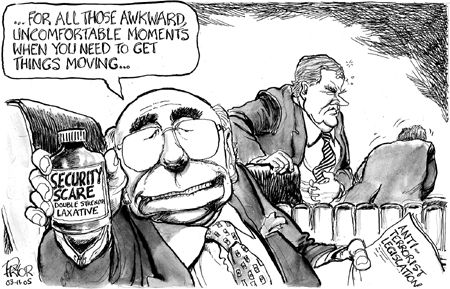|
November 3, 2005
The strategy of the conservatives in Australia has been to remind us constantly about the danger of terrorist attacks.Yesterday was a classic example of forwarned danger coupled to legislation to increase the powers of the national security state. They have become authoritarians defeating us from terrorists and happy to be so.

Pryor
There is nothing new about this strategy for gaining and holding power. Writers from the ancient Greek historian Thucydides to Baron de Montesquieu to Herman Goering in the twentieth century have told us that all national leaders need to do to retain power is to focus on an external threat and accuse those who won't go along with their plans of a lack of patriotism and exposing the country to danger.
Though terrorism is a genuine threat, the ceaseless use of the rhetoric of terror, violence and danger has been accompanied by a growing number of false alarms about the enemy within who is destroying our civilised society. In Australia we citizens are not only warned that we should be afraid, but are told exactly how afraid we should be (through different kinds of alerts), and yet, regardless of how afraid we should be, we are given little advice about what to do.
So we become frightened and scared. We are in the process of becoming a frightened and frightening nation, a nation filled not with generosity and humanity and decency and charity, but a nation that seems unable to find any deeper reason for its patriotism than a profound, and cynically manipulated atmosphere of anxiety and fear.
That is my initial interpretation of the discourse of terrroism .In an essay I referred to earlier---Terror Australis: Security, Australia and the 'War on Terror' Discourse in Borderlands Katrina Lee Koo takes this much further. She says:
While we certainly need to critically reflect upon questions such as, 'what constitutes terrorism? who are the terrorists? where do we confront them and how?' we just as urgently need to critically analyse how we think about these questions. In particular, we need to ask: 'What is this discourse of terrorism? Who generates it? How does it enable the kinds of changes we are seeing in our society, and are they consistent with the broader notions of security to which we aspire?'
She tackles the second set of questions about the discourse of terrorism which are concerned about the way we think and talk about terrorism. Katrina Lee Koo says that her essay makes two arguments:
Firstly, John Howard's adoption of Bush's 'War on Terror' discourse
.. reinforces many of the underlying assumptions that have been present throughout Australia's search for security in international relations since Federation. From that time, in one form or another, the dominant Australian security politics has demonstrated four rigid commitments: a belief in its own insecurity, a faith in a statist ethic, a commitment to the practices of violence and, finally, a repetition of certain identity practices. And secondly, her essay argues that:
...the 'War on Terror' discourse not only reinforces and naturalises these foundations of Australian security but also intensifies it in ways that need to be questioned. The familiarity of the 'War on Terror' discourse, and the ease with which it has become assimilated into the Australian security project, has resulted not only in increasingly violent and intrusive security policies both at home and abroad, but also a lack of sustained public debate about them.
|

Very good points. I too am concerned about these issues, but I find that the important questions you raise often get muddled in so many other issues.
Very often, you have groups such as:
- Pacifists (opposed to any military actions)
- Conspiracy theorists
- Political/cultural opponents
- people against the party in power
- people with hates of various nations
- office holders with military/economic agendas
and so on. These folks, as good or bad as their various agendas may be, really make it difficult for a person like myself to talk about both terrorism, fighting terrorism, and dealing with HOW we handle the fight against terrorism in a sensible manner.